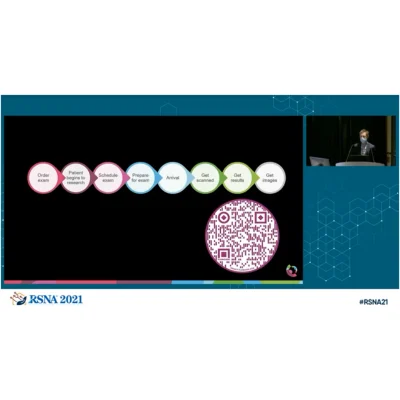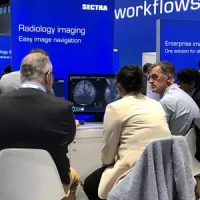A panel of experts at RSNA 2021 focused on enterprise informatics.
The keynote speaker, Dr Alexander Towbin of Cincinnati’s Children’s Hospital discussed using imaging informatics to engage patients in managing their own health. He described opportunities at several points along the patient value stream (at patient research, arrival, and receiving results) where radiology centres can engage patients. When patients begin to research, social media outreach ensure explanations by radiology centres come first. His medical centre focusses plain language blogs on patient education and patient centred topics including patient stories, research breakthroughs, and the unique features of their centre and people. At arrival, digital messaging and map scan help guide patients to the centre. Digital waiting rooms can help loved ones track where patients are in the imaging process. In receiving results, the option for the patient to message providers regarding results is present as well as see their own images through the EHR.
Dr Lauren Shreve of the University of Pennsylvania discussed using AI-assisted Indication Selection to facilitate the appropriateness scoring of free text orders. The U.S. Protecting Access to Medicare Act requires clinicians to consult appropriate use criteria via a qualified Clinical Decision Support Mechanism when ordering advanced imaging for Medicare patients. Free text orders are mostly unscored, so an AI tool to provide structured indications was tested. Scored orders increased from 31.8% to 50.9% and free text only orders declined by 59.3%. However, even after intervention, one-third of orders lacked structured indications and half of orders remained unscored.
Dr Sun Young Park of IBM Watson Health Imaging discussed a reinforcement learning model to optimise clinical study distribution with the objectives of fairness, workload balance and study priority within a PACS distribution engine. The algorithm outperformed traditional distribution rules (study number, lowest study number, last assignment time, reader skill based, or a combination of these factors) for assigning studies to provide more balanced, efficient, and comfortable study distribution.
Dr Andrew Sher of Texas Children's Hospital discussed how point-of-care ACR-clinical decision support software embedded in the electronic health records (EHR) on CT ordering patterns in a quaternary care paediatric hospital. It decreased the ratio of clinically inappropriate to appropriate CT exams ordered by referring physicians.
Dr Hailey Choi of the University of California San Francisco discussed how patient access to their images through patient portals affected radiologists. They remained largely unaffected. Patients only contacted a minority of radiologists for their imaging, a few times a year.
Source: RSNA






.jpg)



